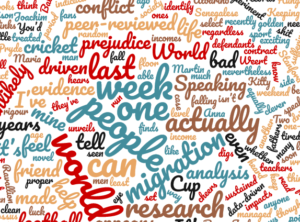Hi all,
Poor old England. Only they could set a cricket world record and be overshadowed by Egypt vs. Russia or some such thing. It’s an amazing turn-up for the books: England, of all teams, have the most exciting one-day cricket side in the world. Think about that. It’s a sentence that Spike Milligan would have rejected as too outlandish for his nonsense poetry even two years ago. Speaking of the World Cup, though, a friend of mine e-mailed to tell me that I’m all wrong: this is a golden age of British football writing. Is this true? I’ve read precisely one article about football that actually attempts to expand our understanding of the game in the last four years. Is anyone else actually advancing what we know about the sport, or is it the same tired ‘analysis’ of different formations and players, driven by confirmation bias and prejudice?
- Speaking of prejudice, remember how last week I suggested that the news about the Stanford prison experiment might mean that people aren’t the pits? My goodness did I speak too soon. This last week has left me more bereft of hope in humanity than any in my life so far. Where do we start? We’ve had a policy of, not to put too fine a point on it, doing horrible shit to children in the name of reducing migration. And worse, it’s actually more popular than not among Republicans. Hungary have made it a criminal offense to offer help to some of the most desperate and needy people on the planet. And it appears that anti-terrorism law has been used to deport high-skilled migrants for undertaking legal corrections to self-declared tax records. I am ashamed to be human this week.
- Meanwhile, what does actual evidence tell us about migration? That violence and appalling economic conditions drive child migration. And that even those coming from places suffering from conflict driven by climate change do not increase conflict at their destination. Lock them up!
- Keeping on this general theme of the world being full of terrible people, let’s talk about bail hearings in New York City. “Because the assignments are random… we can identify whether defendants are being treated equally regardless of who hears their case. They are not.” Anna Maria Barry-Jester, one of 538’s brilliant data-driven journalists, digs in to how much the bad luck of being heard by one judge rather than another can affect your life. This is not peer-reviewed research and isn’t perfect, but is nevertheless indicative of how good journalism can be with proper attention to rigour and evidence.
- What’s that? You’d like some peer-reviewed research to feel bad about? Martin Ravallion is here to help. He unveils a novel way of assessing the ‘income floor’ in a society (that level below which incomes are unlikely to be able to fall below for a sustained period), and finds that it has been falling, in the US at least. It appears that they’ve run this analysis for a number of other countries – so keep an eye out.
- I’ve seen research (proposed and in progress) recently looking at how developing countries can select better teachers through clever contract design. Lee does a little digging and discovers it’s unlikely that there are many substantially better educated people than the ones already selected.
- Two gender links from the other perspective: 538 on what men think it means to be a man, and Stefan, Kathleen Beegle and Joachim De Weert on the developmental impacts of fathers.
- Has anything made me feel good about the world this week? Well, Japanese and Senegalese fans apparently clean up after themselves at the World Cup, Kitty Pryde is getting married to Colossus (this one is fictional, btw), and I managed to convince a friend of mine that ‘Albariño’ is a Brazilian footballer. So, slim pickings. Listen to Baloji. That usually cheers me up.
Have a great weekend, everyone!
R

